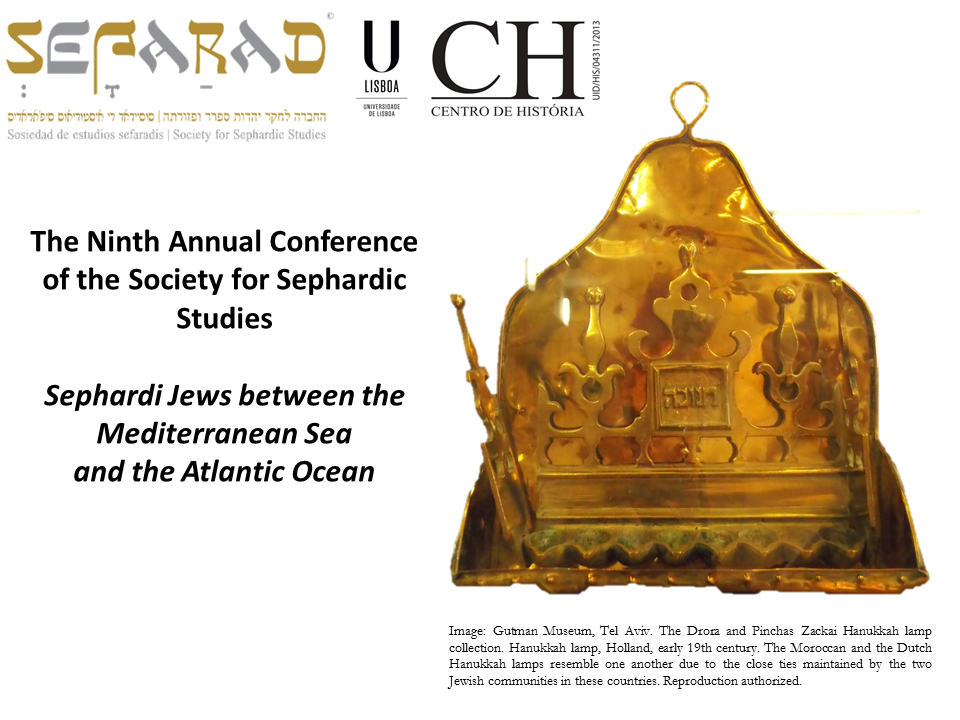School of Arts and Humanities of the University of Lisbon
|
Faculdade de Letras da Universidade de Lisboa
|
Call for Papers
Deadline extended: 23 January 2019
The Iberian Peninsula is located between the Mediterranean Sea and the Atlantic Ocean. This geostrategic position played a significant role in the fate of Iberian Jews over the centuries, in particular in the context of their multiple Diasporas. Many Jews and even more conversos, with their multifaceted identities, participated in the development of the Iberian colonial empires on the African and American shores of the Atlantic. These migrations, although in very different conjunctures, continued to take place after the independence of the former colonies, creating colourful networks and milieus, identities and memories. It was Fernand Braudel who proposed sketching the history of the Atlantic against the background of its connections with the Mediterranean.
The main purpose of the Ninth Annual Conference of the Society for Sephardic Studies (in keeping with this year’s location) is to explore from a broader chronological, geographical, and thematic perspective the long and multifaceted experience of Sephardi Jews between the Mediterranean and the Atlantic. While bearing in mind that the Ocean stretches from Northern Europe to the confines of North America and the Strait of Tierra del Fuego, we would like to examine the affinities between different experiences and imperial policies, economic, social, cultural and political agents, and the new state entities of the 19th and 20th centuries. These relations are increasingly being understood in a dialectical way. Therefore, we welcome papers that treat them as such or that focus on one of the following subjects:
Papers may be delivered in English, Hebrew, Portuguese or Spanish. However, we suggest that papers in languages other than English be accompanied by a handout with a brief summary or PowerPoint presentation in English.
The proposals should include:
1 – Name
2 – Title
3 – Academic affiliation
4 – Abstract in English (maximum 400 words)
and should be sent before 15 January 2019 filling out the online form available at this page.
* Depending on the interest of the participants, we are planning a study trip to Belmonte on 26th June.
The main purpose of the Ninth Annual Conference of the Society for Sephardic Studies (in keeping with this year’s location) is to explore from a broader chronological, geographical, and thematic perspective the long and multifaceted experience of Sephardi Jews between the Mediterranean and the Atlantic. While bearing in mind that the Ocean stretches from Northern Europe to the confines of North America and the Strait of Tierra del Fuego, we would like to examine the affinities between different experiences and imperial policies, economic, social, cultural and political agents, and the new state entities of the 19th and 20th centuries. These relations are increasingly being understood in a dialectical way. Therefore, we welcome papers that treat them as such or that focus on one of the following subjects:
- The presence of Jews and conversos in Portugal, Spain and their colonial spaces: religious and cultural affiliations.
- Jews and conversos in the Atlantic metropolises of Hamburg, Amsterdam, and London: the Mediterranean socioeconomic and cultural background.
- Jews and conversos in the Atlantic colonial spaces: social, religious, political, and cultural issues.
- Migration movements to Africa and America in the 19th and 20th centuries: the (re)encounter with Mediterranean values.
- Cultural production in Diaspora territories: material, oral, and written sources.
- Memories and thoughts about the Mediterranean in the Atlantic area.
Papers may be delivered in English, Hebrew, Portuguese or Spanish. However, we suggest that papers in languages other than English be accompanied by a handout with a brief summary or PowerPoint presentation in English.
The proposals should include:
1 – Name
2 – Title
3 – Academic affiliation
4 – Abstract in English (maximum 400 words)
and should be sent before 15 January 2019 filling out the online form available at this page.
* Depending on the interest of the participants, we are planning a study trip to Belmonte on 26th June.
Executive and Organizing Committees
Executive Committee
Eliezer Papo
José Alberto Tavim
Tamar Alexander
Ricardo Muñoz-Solla
Yaron Ben-Naeh
Organizing Committee (Lisbon)
Ana Pereira Ferreira
Ana Rita Leitão
Ângela Benoliel Coutinho
Hugo Martins
José Alberto Tavim
Miguel Andrade
Eliezer Papo
José Alberto Tavim
Tamar Alexander
Ricardo Muñoz-Solla
Yaron Ben-Naeh
Organizing Committee (Lisbon)
Ana Pereira Ferreira
Ana Rita Leitão
Ângela Benoliel Coutinho
Hugo Martins
José Alberto Tavim
Miguel Andrade



